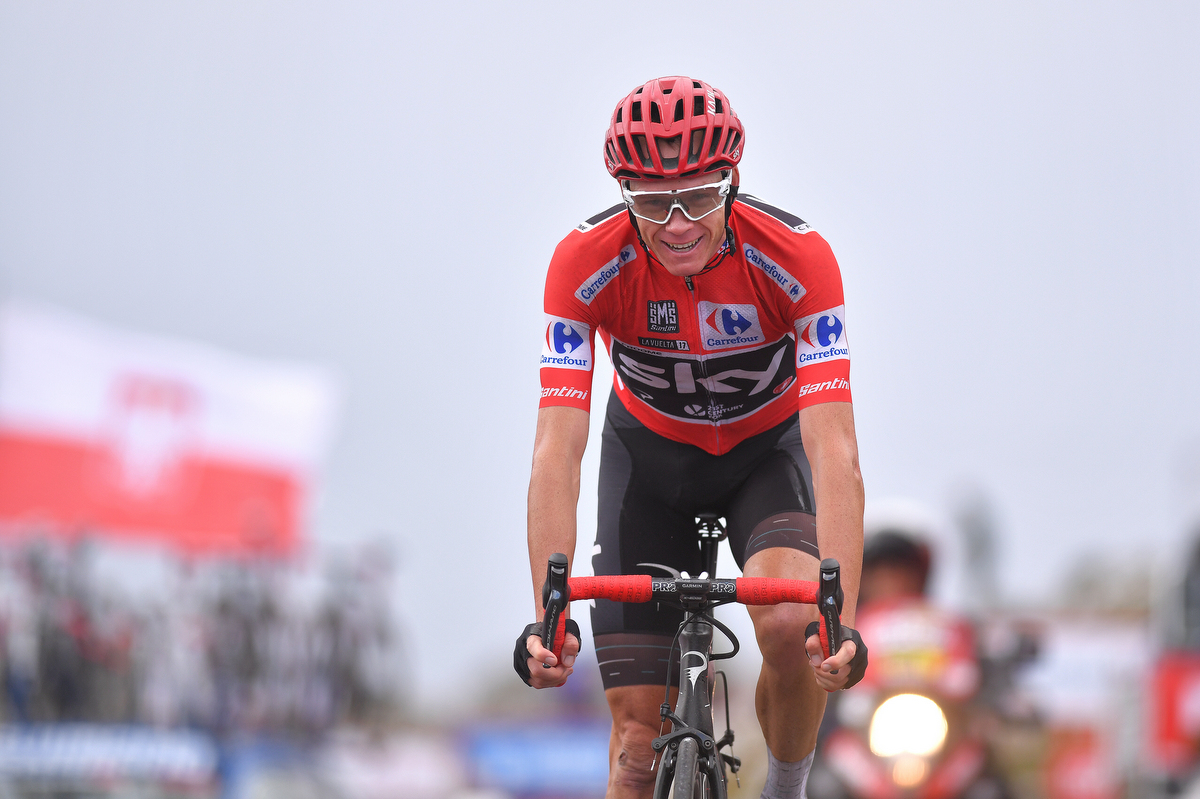Compton questions Chris Froome's asthma medication claims
US 'cross champion: "My gut tells me something more is going on"




Katie Compton has cast doubts on the basis for Chris Froome's assertions that the use of his asthma inhaler resulted in an anti-doping test that found too-high levels of the drug salbutamol in his urine during the Vuelta a Espana. Compton has suffered from exercise-induced asthma throughout her career - on days it's under control, she is rarely outside the podium positions. On days when it's not, she can hardly pedal the bike.
For example, in December, Compton was third in Loenhout, and then dropped out of a race in Bredene the next day because of an asthma attack. She recovered to win the GP Sven Nys in Baal three days later. It's a pattern that has plagued her career.
When asked if Froome's anti-doping troubles made her worried about treating her own asthma with salbutamol, she laughed.
"In Bredene, I had an asthma attack. I used my inhaler four times before the race, and then I had an attack, so I used it three times post-race to get me back to where I needed to be," Compton told Cyclingnews. "That was a legit[imate] asthma attack. That still is underneath the legal limit of salbutamol."
An inhaler delivers a fast-acting bronchodilator (beta2 adrenoceptor agonist or IBA) - in microgram quantities, typically 90-100 mcg per puff. The limit for salbutamol set by the World Anti-Doping Agency is 800mcg inhaled per 12 hours, or 1600mcg over 24 hours, and numerous scientific studies have shown that inhaling the drug within these limits causes very few athletes to test over the urine limit of 1000ng/mL.
But Froome insists that he used his inhaler as normal, and it resulted in a urine value that was twice the WADA limit - a sequence Compton challenges from her own experience.
"As someone who has exercise-induced asthma and allergies - if I have an asthma attack, I can't finish the race. I can barely pedal, let alone keep pushing hard. The rescue inhaler is exactly that - it's there for a few puffs to get you back to normal. It helps you breathe better, but granted, if I went hard again, I'd have another attack.
The latest race content, interviews, features, reviews and expert buying guides, direct to your inbox!
"It doesn't make sense that you could have that much in your system and still be able to pedal that hard. I don't know. I feel like something else is going on.”
Researchers over the past decades have found a strange paradox in elite athletics - asthmatic athletes were performing better than their non-asthmatic peers.
At the 2012 Olympic Games in London, 700 of the 10,000 athletes were asthmatic – a percentage in line with the general population – but they were twice as likely to win medals than non-asthmatic athletes.
Until 2010, WADA had strict TUE requirements for salbutamol to prevent its use for performance enhancement. But numerous studies have debunked the idea that therapeutic doses are peformance-enhancing, and WADA now allows the use of IBAs without a TUE within the allowed limits.
Researchers are now investigating whether asthma attacks themselves cause a ‘refractory period’ that enhances lung and heart efficiency during competition as a way to explain the paradox.
But the suspicion that athletes are abusing salbutamol continues, fuelled perhaps by the fact that healthy Norwegian skiers have been accused of using inhalers with the idea it would boost performance.
The questions around Froome are exacerbated by Team Sky's own 'marginal gains' philosophy and the recent lengthy inquiry into their use of Therapeutic Use Exemptions for injected corticosteroids with Bradley Wiggins - a legal, but potentially performance-enhancing practice.
"I just don't know about Froome's explanation about the high amount simply being from using his inhaler a normal amount," Compton said. "And with all the past issues with the Sky team pushing the 'gray area' with TUEs, I feel it's a bit suspicious."
Compton allowed that Team Sky principal David Brailsford could be correct in his confidence that Froome's values were the result of a unique physiology.
"I could be completely wrong, seeing that we all metabolize things we ingest differently, maybe it's just the way his body breaks it down," Compton allowed, "but I feel there is more to the story than that. It's a tough call and I know the WADA rules need to be followed but my gut tells me there's something more going on."
- Froome returns adverse analytical finding for salbutamol
- A lot of explaining to do: The questions raised by the Chris Froome salbutamol case
- Chris Froome: I haven't broken any rules
Froome has thrived in races where quitting because you can't breathe is not an option - regularly winning or placing on the podium of Grand Tours. Compton's asthma has taken a lot of experimentation to get it under control. But she still has days where training and racing are impossible.
"I'm learning how to manage it, checking in with my body every day and seeing what I can do. Sometimes I wake up and I feel good or I don't, and I know. Some days I have to get on the bike and ride a bit before I know. Instead of stressing about training, I have an idea of what I have to do, and if I get on the bike and feel good, I do them. and if I don't, I just do some recovery and do the intervals the next day.
"For racing, I just need to make sure I take my allergy meds and my inhaler. I have a good diet - and if my diet's good that affects the breathing. I have to be proactive, to do what I can, and then know when to back off. That's why I dropped out at Bredene. It was such a bad day for me, I woke up feeling bad, and when I got to the race I was unsure. When I started I couldn't breathe, and I dropped out on the second lap. I just couldn't do anything more. I have those days - if it had been training I would have done a recovery ride and gone home. I'm still working at things to be better, but I'm managing well right now."
For Froome, his season now hinges on convincing the UCI and WADA, not other athletes who have questioned him.
Froome has been cooperating with the UCI, sharing his asthma control methods and insisting that he broke no rules.
"I do understand this comes as a big shock to a lot of people," he said last month. "I certainly haven't broken any rules here. I haven't taken more than the permissible amount. I'm sure at the end of the day the truth will be told."
Compton will compete for her 14th straight US national cyclo-cross title on Sunday, January 14. Cyclingnews will have more on Compton's successful season in Belgium coming, along with live streaming coverage of the USA Cycling National Championships.

Laura Weislo has been with Cyclingnews since 2006 after making a switch from a career in science. As Managing Editor, she coordinates coverage for North American events and global news. As former elite-level road racer who dabbled in cyclo-cross and track, Laura has a passion for all three disciplines. When not working she likes to go camping and explore lesser traveled roads, paths and gravel tracks. Laura specialises in covering doping, anti-doping, UCI governance and performing data analysis.